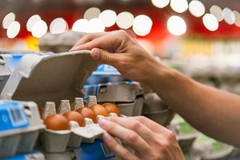✕



✕

Tag:animal welfare food quality 2024-10-17 11:28

Nearly 83% of consumers in Singapore demand food companies, including restaurants, retailers and packaged foods brands, to source their eggs from farms that use cage-free production methods, a survey has revealed.
The findings show that cage-free eggs are not a new concept in Singapore, with 44% of the respondents saying they “occasionally” opt for cage-free eggs. Meanwhile, 15.5% stated they choose such eggs often.
“These new survey findings underscore how important it is for food companies to prioritize animal welfare and other ethical sourcing practices in their operations,” said Vilosha Sivaraman, sustainability program manager at Lever Foundation, an NGO that supports companies in Singapore and across Asia on sustainable sourcing.
Tokyo, Japan-based company GMO Research conducted the survey with 200 individuals, out of which 43.5% were women and 56.5% were men. Ages ranged from 18 to over 50, with over 60% aged 26 to 40.
Prioritizing animal welfare and food quality
Nearly 90% of the consumers believed food companies should source all animal protein from a supply chain that adheres to humane standards of animal treatment.
The national survey found that 88% of consumers agreed with the statement: “Hens that produce eggs should not be kept in cages; they should have the freedom to walk and move around.”
They also prefer higher-quality cage-free eggs, with 39% of respondents considering this a valuable advantage over caged eggs. Animal welfare was the next most valued advantage (30%), followed by improved safety (25%).
Supporting business opportunities
The survey also found that consumers are willing to pay a price premium for the shift to cage-free eggs. Nearly 57% of respondents said they would pay 10-25% more for cage-free eggs in supermarkets and 53% were ready to spend 5-10% more for a restaurant meal or packaged food product that used these eggs.
“As consumer awareness and demand for improvements like cage-free eggs continue to rise, businesses can seize the opportunity to enhance their brand reputation by aligning their sourcing standards with consumers’ expectations,” asserts Sivaraman.
For restaurants and packaged foods brands, using a cage-free egg in place of a conventional egg in a meal or product that contains egg typically “increases the total cost of producing the meal or product (including all ingredient costs, labor and similar) by 1% or less,” states GMO Research.
Meanwhile, for supermarkets, the wholesale price difference between low-cost cage-free eggs and caged eggs in many markets in Asia is at or under 25%, and in all markets that cost difference “will continue to narrow as cage-free egg production increases.”
Nearly six billion hens live in tiny, cramped cages that prevent them from stretching their wings, reports the Open Wing Alliance, which aims to free egg-laying hens from cages.
Caged systems lead to fear, poor bone health, reproductive disease and stress in egg-laying hens. This contributes to animal welfare concerns that consumers and companies are taking note of by transitioning to cage-free eggs.
The survey states that in Singapore, food companies such as Ascott, Coffee Bean & Tea Leaf, Subway, Delifrance and Swensen’s have announced commitments to sourcing only cage-free eggs in response to evolving customer values.
The European Food Safety Authority also recommends discontinuing cage use. Last year, it called for a complete ban on chicken cages across Europe.
House of Lords report urges complete ban on junk food advertising
Clinical research finds daily pistachio consumption may “significantly improve eye health”
Nestlé taps diverse food trends with ready-to-prepare Asian and Mexican culinary products
USDA backs Campbell’s sustainable tomato cultivation efforts to propel “climate-smart agriculture”
Symrise bolsters regenerative farming to secure stable supply for natural ingredients
Daymer Ingredients to distribute Revyve’s egg-replacing texturizers in the UK
About Us Terms of Service Privacy Policy Contact Us
Hotline(+86)17301604571
 Enterprise WeChat
Enterprise WeChat
for Client Service
 EZBuy
EZBuy
WeChat APP
Sinoexpo Digital Platform
Shanghai Sinoexpo Informa Markets International Exhibition Co., Ltd. All rights reserved
沪ICP备05034851号-77
 沪公网安备31010402000543号
沪公网安备31010402000543号